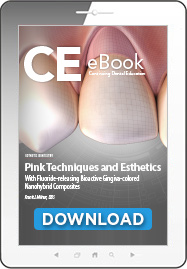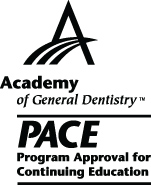CDEWorld > eBooks > Pink Techniques and Esthetics With Fluoride-releasing Bioactive Gingiva-colored Nanohybrid Composites


ADA CERP is a service of the American Dental Association to assist dental professionals in identifying quality providers of continuing dental education. ADA CERP does not approve or endorse individual courses or instructors, nor does it imply acceptance of credit house by boards of dentistry. Concerns or complaints about a CE provider may be directed to the provider or to ADA CERP at www.ada.org/cerp/

Approved PACE Program Provider. FAGD/MAGD credit. Approval does not imply acceptance by a state or provincial board of dentistry, or AGD endorsement. 1/1/2023 to 12/31/2028. ID # 209722.
eBook
Released: Thursday, April 20, 2017
Expires: Tuesday, March 31, 2020
Pink Techniques and Esthetics With Fluoride-releasing Bioactive Gingiva-colored Nanohybrid Composites
By Frank J. Milnar, DDS
Commercial Supporter: Shofu
The composition of the smile architecture includes pink gingiva and white tooth structure that complement each other in balance and harmony. While the health and appearance of gingival tissues significantly affect smile esthetics, many patients present with gingival recession that contributes to unsightly smile esthetics. New bioresponsive direct restorative materials represent an opportunity for dentists to directly correct the appearance of an “absence of pink” in a cost-effective and minimally invasive manner, placed according to a comprehensive understanding of the pink components of the smile and requisites for gingival health.
LEARNING OBJECTIVES:
-
Discuss the significance of pink esthetics to the composition of the smile architecture.
-
Discuss considerations for using direct composite restorative materials to restore pink esthetics.
-
Explain the mechanics of building prosthetic gingival restorations with bioactive pink composites.
-
Identify the elements of the armamentarium needed for reproducing pink gingival esthetics.
About the Author
Frank J. Milnar, DDS
Private Practice, St. Paul, Minnesota


